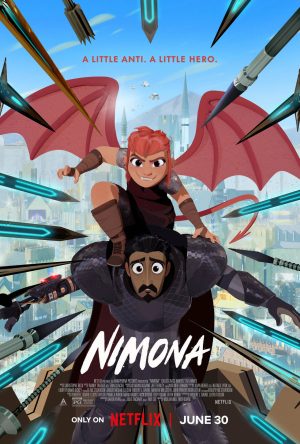Nimona
 When I said that I did not expect to see a better film than Across the Spider-Verse this year, I really was not expecting to see another brilliant animated film just a couple of weeks later.
When I said that I did not expect to see a better film than Across the Spider-Verse this year, I really was not expecting to see another brilliant animated film just a couple of weeks later.
Nate Stevenson is, of course, already responsible for the brilliant She-Ra and the Princesses of Power TV series. Nimona is based on his critically acclaimed graphic novel of the same name. I understand that the film deviates from the original in some significant ways, but I’ve not read the latter and I didn’t notice anything amiss so the translation to screen clearly worked.
The setting of Nimona is a fantasy kingdom that, hundreds of years ago, walled itself off from the world to keep itself safe from monsters. Nowadays knights carry laser swords and ride flying bikes dressed up as horses, but the culture remains. Inside the wall is safe, outside is scary.
The corps of knights was formed in honour of Gloreh, the warrior who slew the first Monster and helped create the wall. Up until now, knighthood had been the preserve of the upper classes, but the current Queen is determined to democratise the kingdom and Ballister Boldheart is about to become the first low-born lad to be knighted. Sadly, things will go disastrously wrong, and Ballister will end up in hiding, hunted by his fellow knights, including his lover, Ambrosius Goldenloin.
Into Ballister’s life comes Nimona, a red-haired teenage girl with attitude. She offers to help him, and it soon becomes clear that she has an agenda of her own, one that strikes at the very heart of the culture of the kingdom.
Much of the talk around the film is about it being a trans allegory, and it sort of it. Nimona is a Monster because she’s a shape-changer. Also Stevenson is a trans guy, and he has filled his cast with queer folks, including Indya Moore and RuPaul. However, I think it is more accurate to say that the film is a critique of White Feminism. The idea that (white) women have an urgent and overwhelming need to “feel safe” from the imagined threat of trans people is a core of the current anti-trans movement, but that tactic has also been wielded against other queer folks, and against people of colour. The fact that Stevenson has chosen a male lead actor, Riz Ahmed, who is known as a Muslim rights activist is, I think, a testament to his commitment to intersectionality.
Nimona herself is played by Chloë Grace Moretz who I’m now familiar with from The Peripheral. She’s brilliant in this too, and probably had a lot of fun doing it.
We are somewhat lucky to have the film at all. It was originally commissioned by a subsidiary of 21st Century Fox. When Disney bought that company they canned Nimona due to the queer content. Stevenson had to hustle hard to get it picked up by someone else. So thanks are due to Annapurna Pictures, and to Netflix for providing distribution. I’m now very much hoping for a Blu Ray release before the film disappears from streaming.